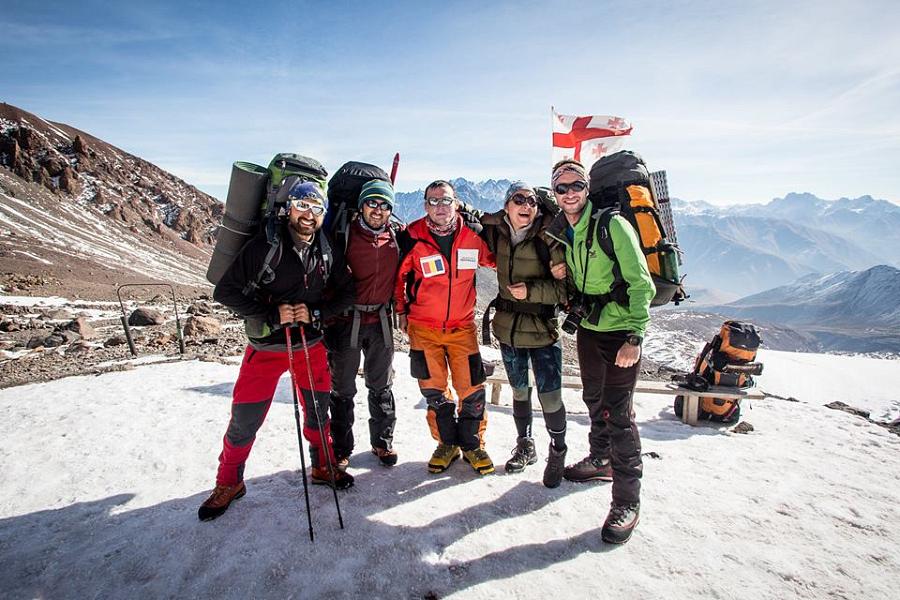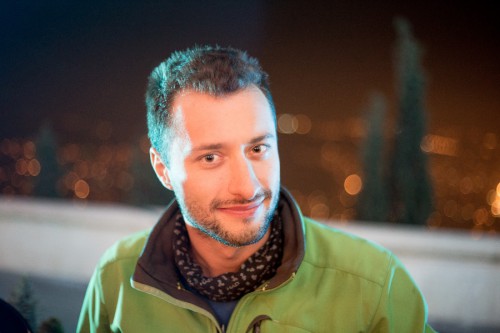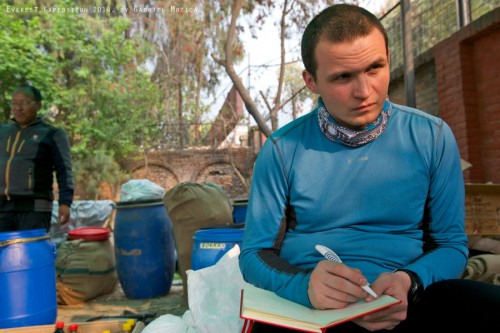In the fresh, cold mountain air, two Romanians go international and elevate diplomacy to new meanings



Two friends start climbing the world’s peaks, higher and higher. During the process, they discover the mountains inside them.
“I am 30,” replies Tiberiu Pintilie after thinking for a bit. “Damn it, I almost forgot my age.”
“Do you still feel young?”
“Youth is subjective. Everything is subjective. In the Tian Shan Mountains, we climbed with a 79-year old Russian man who had escalated 7000m peaks one hundred times. He was a pensioner and a guide for tourists. Just like somebody would guide the tourists in Sinaia, only that he was doing it at 7000m,” says Tiberiu - who also goes by the short Tibi.
“We could not keep pace with him. He had such a great spirit,” adds 28-year old Adrian Fako.
The two men are the creators of Adventure Diplomacy, a project that wants to combine networking with mountain climbing.
Tiberiu and Adrian recently organized a workshop in the Kazbegi region in Georgia, where 12 young leaders from the Black Sea region met and tried to hike mountains and create links.
The mountains are a big test for human relationships, the two friends say. “Up on the mountain, in harsh conditions, you are who you truly are.”
The Turquoise Goddess changes lives
Adrian Fako (pictured below) has inherited his adaptability from his mother. She has worked all her life in two companies that closed. She found herself in a difficult situation: she was a jobless woman in her 50s. But her son brought her down to earth. “At 50 you are not retired yet. You have a laptop and starting tomorrow, you’ll learn how to use Google Docs.” She is now working at the Impact Hub in Bucharest, a working place for startups, as an accountant for Adrian’s digital agency.

“I gave birth to you 20 years ago and now I need to call you boss,” his mom told him laughing. Adrian is not bossy, but is very determined. He wants to see things moving forward. His company grew 32 times in 4 years, he says. It is called 8000Plus. The name is not random. In 2011, Fako almost died at an altitude of over 8,000m on Mount Cho Oyu.
On Earth, there are only 14 independent mountains that are more than 8,000 metres high above sea level. Mount Cho Oyu, who name means “Turquoise Goddess" in Tibetan, stands on the China-Nepal border, not far from Mount Everest.
Adrian and Tibi went up together on that mountain, but Tibi had to descend earlier because of some health problems. At over 8,000 metres altitude, Adrian fainted. It was night and he had no oxygen. Some climbers discovered him unconscious. They didn’t check if he was dead or still alive, but simply threw him aside from a cord they needed to climb on. Adi fell on that cord when he had fainted. He then woke up and had to make a choice: continue climbing or turn back. He decided to return. When he finally met Tibi, his friend told him: “Had you continued, you would have died.”
Tiberiu Pintilie (pic below) grew up in Galati, a lowland area. “So I can appreciate mountains more,” he says.

He has always been fascinated by how things look in a certain way from the distance and very differently once you come close. “The mountain seems calm from a remote distance, but when you start hiking you discover so much movement, so many things happening,” Pintilie says.Not only that you discover the movement inside the woods, but you also become aware of your own interior world. “As you climb the exterior mountains, you also climb the inner mountains.”
Tiberiu worked at a data center until 2014. He discovered a huge world behind the Internet, an entire industry of servers, hubs. As they were interconnecting optical fibre cables, he learned the power of connections.
You can test cable connection to see how strong it is, but you can’t test that easily the strength of human relationships. And that’s the beauty of them, Tibi says. You can meet people, see them laughing and it means nothing. But on the mountains everything comes out, because you’re scared, and you can’t fake it.
What is your Everest?
It was night and they were both wearing balaclavas when they first met in the Alps, so they didn’t really see each other, just heard each other’s voices in the cold alpine landscape. Tiberiu was climbing with his own group and Adrian was accompanied by other people. “There’s another group of Romanians,” somebody said.
The two men became friends because they didn’t have a lot of experience but they were both eager to conquer new peaks. And maybe because they complemented each other. Adrian is more action-based and impulsive whereas Tiberiu is very patient.
After Mont Blanc, they started going on more risky expeditions. In 2014, it was the Everest. They got very close to the peak, only 200 metres left, but because they didn’t have enough oxygen left, they returned. They had planned the trip since 2012. Climbing the Everest is very expensive, so you need to find sponsors. You also need a lot of training and assistance from other people who stay at lower altitudes.
In time, the two men have become more interested in sharing their experiences. “How can you influence people if you are not a politician’s son?” they say laughing. The two friends started with presentations and workshops.
“What is your own Everest?” is the name of a project Tiberiu and Adrian started in 2013. Tibi goes to different high schools and talks about their experience, and projects movies of their trips.
Late last year, he held two talks at the International High School of Informatics in Bucharest: there were too many students for a single presentation.
He asked the kids if they knew who Marco Polo was. A six-grader named Mircea answered with encyclopedic precision. After the presentation, he gave the kid a book. Tiberiu then spotted the boy at the high school cantine. He had already started reading the book, among all the kids eating. Tibi felt happy, because he knows that little gestures can have an influence on the long term.
Adrian is the one who delivers presentations for companies about mountain climbing and their experiences. The two men casted their roles naturally. Having his own company, Adrian better knows the language of business whereas Tiberiu has been more involved with non-formal education.
Too many stars in the sky
Last year Adrian and Tiberiu thought about going one step further. It was time to involve other people, who could, in turn, talk about their own experiences to others. The circle would grew bigger. “Informal relationships among people can lead in time to formal relationships,” the two men believe. And that’s the philosophy behind Adventure Diplomacy.
With the help of the German Marshall Fund, they planned a trip on the Mt. Kazbek. At 5,047 metres above sea level, it is the third highest mountain in Georgia. Adrian and Tiberiu opened a call for young leaders in the Black Sea basin who wanted to join the experience. In mid-October, 12 young people from Ukraine, Armenia, Azerbaijan, Romania, Moldova, Russia met in Tbilisi and headed to the Kazbegi region of Georgia to start their adventure.
It was no easy game. Tibi and Adi made it clear that it would not be a conference where people go to eat and drink. They told the participants they would have stay in refuges, they would not have water.
“The refuge was no four-star hotel, but there were stars in the sky. The sky was very starry, sometimes too starry,” Tibi says.
Most of the participants had no experience in mountaineering. Ana-Maria, a Romanian 25-year old woman, who currently works as a legal counsel in Zurich, slept for the first time in a sleeping bag. “I had had my first toilette with a view (and what a view!!!), I got to know 8 different cultures,” she wrote.
When 35-year old Nadiya read that she was accepted for the expedition she jumped with joy. She lives in Ukraine and works as program director for the the DRO “Committee of voters of Ukraine”. “Usually, I am a happy and joyful person, but last year was very difficult for my country (Ukraine) and for me as well,” Nadiya wrote. “When I saw the announcement about a team-building and leadership expedition for representatives from Black Sea Region in the Georgian mountains I realized that it was exactly that I needed.”
She describes how she met other 11 “strangers” in Tbilisi and immediately started to work on the preparation for the expedition. At the end of the second day she still couldn’t remember all names. But after the trip, she wrote: “We were one and I feel that we still are, even though we have a Black Sea and 1000 km between us.”
Going up the Mt. Kazbek was not only a hiking experience, but also a team-building. But let’s do this differently, thought Tibi and Adrian.
“Let’s not talk about time management. Let’s tell them that by 12 we need to get here, otherwise we’ll get caught by the snowfall,” recalls Adi.
Pintilie adds: “Time management? Go find water because in two hours it gets dark and the water freezes. Resource management? Wait, the water is frozen, what shall we do? Do we melt the snow? But how much gas do we have?”
The two friends want to develop the project. They now have some “warm contacts”. First they will go to each country in the Black Sea basin and they’ll do what they know best: create links, share stories. Next summer, they plan a new expedition. They gave a few hints: Central Asia, sleeping in yurts. But this is the plan only seen from a distance. Once they get closer, it may look different.
By Diana Mesesan, diana@romania-insider.com
(Photos courtesy of Tiberiu Pintilie and Adrian Fako)